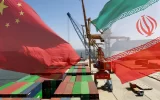The reason for the continuation of Tehran-Beijing oil exchange

According to the exclusive report of Energy Press; Recently, Iran has announced its plan to increase its oil production from about 3.5 to 4 million barrels per day. In this regard, Iran’s Oil Minister Javad Oji said on May 30, 2024: “23 oil industry projects with a total investment of 4.6 billion dollars have been completed and will be put into operation in the near future.” The final increase in Iran’s oil production will affect the production policy of OPEC, because Iran is a member of the Organization of Petroleum Exporting Countries (OPEC). According to experts, although the administration of US President Joe Biden has reduced its control over the sale of Iranian oil, the next administration of the United States is likely to tighten the screw.
In this regard, Iran’s crude oil exports reached 1.5 million barrels per day in the first quarter of this year (2024), which was the highest level recorded in the last 6 years. According to an estimate by Facts Global Energy (FGE), total exports – including condensate – amounted to about 2.3 million barrels per day. Also, this company estimates Iran’s crude oil production capacity between 3.8 and 3.9 million barrels per day.
Nevertheless, Iran seeks to increase its oil production and as a result exports, in which Chinese refineries play an important role because they buy almost all of Iran’s oil. For this reason, the Biden government recently passed new sanctions laws, seeking to put pressure on China and Iran in order to score points in the world of politics. But the success of these sanctions has been faced with questions that can affect its results.
Details of the new sanctions
According to a report by Columbia University’s Center for Energy Studies, US President Joe Biden recently signed new sanctions aimed at reducing Iran’s oil supply to China, which buys about 90% of Tehran’s oil exports. President Biden signed two new laws targeting Iran’s oil exports. The Stop Anchoring of Iranian Oil Act (SHIP Act) requires the US government to impose sanctions on port operators, ship owners, and refineries involved in the Iranian oil trade. Potential targets include ports that allow ships carrying Iranian oil to dock, as well as ships and refineries that buy Iranian oil.
Before this law, however, the US government had the authority to sanction any of these targets. Therefore, from a technical point of view, the SHIP Act does not contain anything new. But this gives the White House more incentive to enforce the sanctions more seriously, as the government is required by law to do so.
The second law is the Iran-China Energy Sanctions Law in 2023. This law specifies that any transaction by “Chinese financial institutions” that includes the purchase of Iranian oil can be sanctioned. The United States previously had the authority to sanction banks involved in the Iranian oil trade, but the move poses a serious threat to Chinese banks and could dissuade many of them from working with refineries that buy Iranian oil.
Also, the new rules require the Biden administration to provide annual detailed reports on Iran’s oil trade and the involvement of Chinese entities. The first report is due by August, and the government is legally required to begin implementing the SHIP Act sanctions in October. According to the claims of the Western media, in the coming months, the pressure will increase on Chinese institutions to withdraw from Iran’s oil business and on the Biden government to impose sanctions against them if they do not withdraw.
Iran’s oil export sanctions
Since 2012, the United States has imposed extensive sanctions against Iran’s oil exports. In the meantime, two sanctions were very effective, firstly, buyers of Iranian oil are threatened by secondary sanctions unless the respective countries significantly reduce their total purchases every six months. From 2012 to the signing of the Iran nuclear deal in 2015, this embargo led to a 60% drop in Iran’s oil exports. Second, it uses the threat of secondary sanctions to force importers to pay for Iranian oil into bank accounts that Iran can only use to finance bilateral trade. By 2015, this sanction led to the accumulation of more than 100 billion dollars of Iranian oil revenue in bank accounts.
The Obama administration lifted both oil sanctions as part of the 2015 Iran nuclear deal, but the Trump administration reinstated them in 2018. Even now, the Biden administration is implementing these sanctions, although it is not as effective as in the past. It should be noted that these sanctions rely on secondary sanctions to change the behavior of participants in Iran’s oil trade, especially refineries and banks. Since small independent Chinese refiners now buy most of Iran’s oil exports, the threat of secondary sanctions is reduced because these refiners are least connected to the US economy. In contrast, Chinese banks are still wary of US sanctions, and Iran still does not have unlimited access to its oil revenues in bank accounts.
Tags:oil
- Comments sent by you will be published after approval by site administrators.
- Comments that contain slander will not be published.
- Comments that are not in Persian or not related to the news will not be published.

Comments
Total comments : 0 Awaiting review : 0 Date: 0